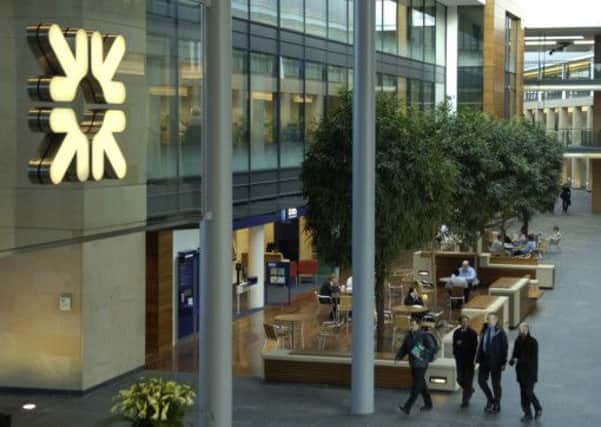RBS sets aside £400m for rate rigging claims


The news came as the taxpayer-backed lender yesterday reported pre-tax profits of £1.27 billion for its third trading quarter, the third consecutive quarter of profits this year.
However, Ross McEwan, chief executive of RBS – still 80 per cent owned by the state following its £45bn bailout in the financial crash – said: “I don’t think we should be thinking about dividends until we’ve got a really good capital build and seen some of the bumps in the road [continuing legacy issues] out of the way.”
Advertisement
Hide AdAdvertisement
Hide AdRBS revealed that it had a core tier 1 ratio – the capital that backs the bank’s loanbook – of 10.8 per cent at the end of Q3, and has set a target of holding core capital of more than 12 per cent by end-2016.
“There’s no way we will be paying a dividend until we get ourselves well in advance of that 12 per cent target,” McEwan said.
RBS’s decision to make a major provision to cover the costs of the forex market manipulation probe follows the decision by Barclays earlier this week to set aside £500m on the issue, with the industry as a whole believed to have made total provisions of $6.5bn (£4.1bn).
McEwan said “no-one should be in any doubt about the seriousness” with which he viewed such issues, but warned they would be likely to hit profits in the quarters ahead. The forex manipulation, which was revealed after major banks were already under scrutiny for rigging benchmark lending rates such as Libor, relates to daily
fixing rates that traders are alleged to have manipulated to suit their own market positions.
RBS is also being probed by regulators about its selling of bonds backed by mortgages in the US and its treatment of small businesses.
The Q3 profit compared with a £634m loss in the same three months of 2013, and was an improvement on the £1.01bn profit in Q2. A release of £800m in previous bad debt provisions at Ulster Bank and the company’s so-called “bad bank” – RBS Capital Resolution – helped the latest performance.
The group also added £100m to its compensation bill for the mis-selling of payment protection insurance (PPI), taking its total for the scandal so far to £3.3bn.
Advertisement
Hide AdAdvertisement
Hide AdMcEwan said a UK economy “in pretty good shape” had helped third-quarter profits at RBS’s core high street and small business banking arm to rise to £499m from £214m in the same quarter of 2013.
He also said a strategic review had resulted in the group deciding to retain Ulster Bank as a core asset, with profits at the subsidiary increasing by £336m to £382m, helped by the release of previous bad debt provisions.
Operating profit at the commercial banking division rose 30 per cent to £407m. However, losses at the corporate and institutional banking business, the group’s investment bank, fell £156m to £21m, driven by lower income and continued retrenchment.
Richard Hunter, head of equities at Hargreaves Lansdown, said: “The previously trailed improvement to the impairment picture, helped along by a benign economic environment in the UK and Ireland, is giving RBS some breathing space.”
The group’s shares closed up 6.2 per cent at 388p.